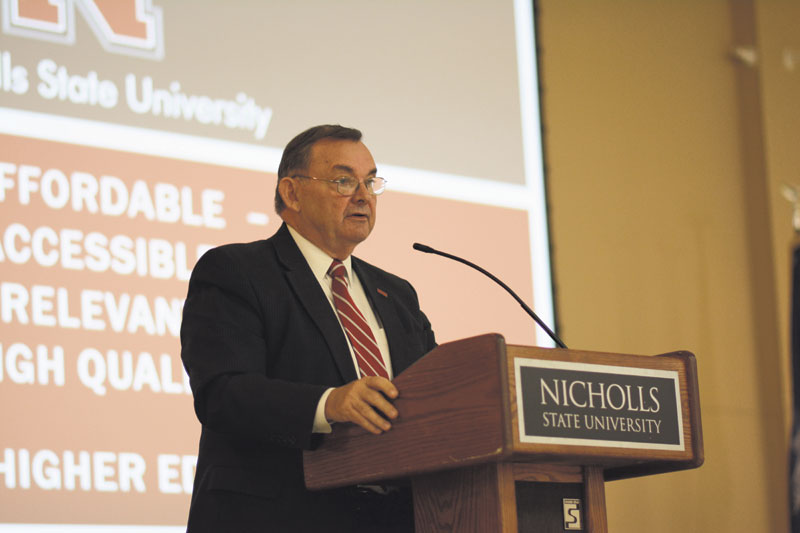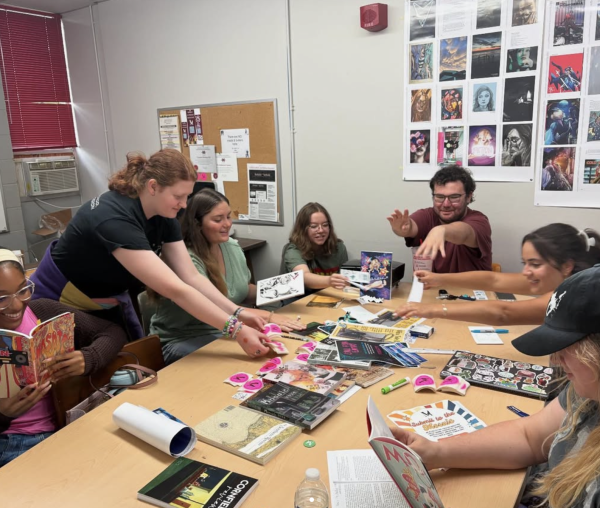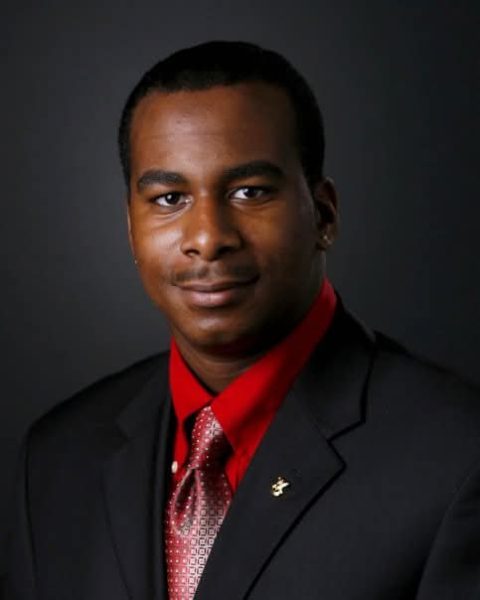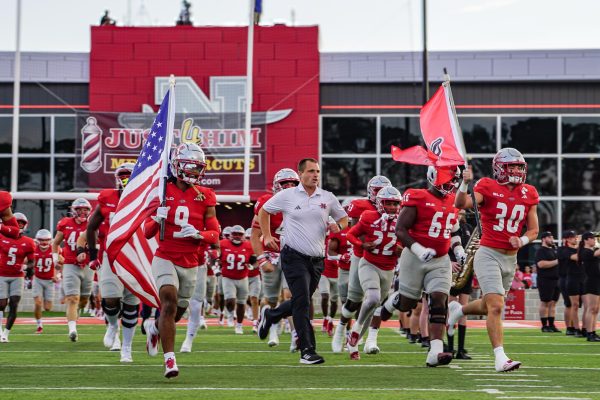President optimistic after Governor’s budget proposal
Photo by: Jeffery Miller
Dr. Bruce Murphy addressing the faculty and staff of Nicholls State University at a Faculty Institute update.
Nicholls State University President Bruce Murphy remains optimistic that the University will be able to continue pursuing its vision.
Murphy said that despite the uncertainty surrounding the state’s budget, the University will continue to work its Strategy Map as a way to guide it towards its goals. Murphy worked with the Strategic Planning Group, a broad group of individuals, to craft a vision, mission and goal for the University that are all outlined in the Strategy Map. Murphy said the University will use the Strategy Map to determine what is important to Nicholls when the upcoming budget is available.
“All of a sudden you get this curveball, and it’s that your budget may be cut, may not be cut, may be increased. We don’t know. That’s the other part of this: we don’t know what’s going to happen to the budget. We have a budget that we’re executing. We have the 14/15 budget and sometime in the future? We will have a 15/16 budget. When that happens, we will execute that, and the Strategy Map helps us understand what’s important to us,” Murphy said.
Governor Bobby Jindal rolled out his budget proposal Friday, which avoids the doomsday scenario caused by the $1.6 million budget shortfall. Cuts to higher education, once rumored to be upwards of $400 million prior to Jindal’s proposal, are now projected to only total $211 million. However, Jindal’s proposal relies on $526 million from the state scaling back refundable tax credits, which may face opposition from business and industry. Historically, the budget that the governor submits is close to the final budget approved by the legislature in May or June.
The budget also suggests that legislators allow universities to increase fees. Murphy said that increasing the cost of higher education for students is not the route he wishes to take.
“Education ought to be fully funded. I don’t mean totally free, but it’s getting to the point where there’s not a lot of difference between the public universities and the private. Some of the other presidents say they want authority to raise tuition, fees and stuff like that. I don’t want to raise fees. I think our students are paying enough,” Murphy said.
Murphy likened a college education to any other good in that it works on a supply and demand system. If you increase the cost of the good, then fewer people will be able to afford it. However, if you lower the cost, it expands the market.
“If we hold our tuition and fees stable and increase enrollments, then we’ll be great in the future. We’re trying to grow that so that we will be self-sufficient in that regard. When you start pricing students out of the market, not only from the social standpoint is that not the right thing to do, saying only the guys that have enough money can come, but you’re also drawing your numbers down,” Murphy said.
Jindal’s budget includes several legislative options that could be used to help further reduce the impact of higher education budget reductions in the upcoming fiscal year. The Workforce and Innovation for a Stronger Economy (WISE) bill, which provides a direct link between higher education and the region’s workforce, will continue to be supported under the governor’s budget proposal.
The Taylor Opportunity Program Scholarship (TOPS) will see a 13.7 percent increase in funding. According to highlights of Jindal’s budget proposal, TOPS has received a 142 percent increase, up from $117 million, in funding since fiscal year 2008 when Jindal took office.”
TOPS would be directly affected by any increase in tuition by the state’s universities and colleges, as any hikes would impact the program’s funding, which Jindal has opposed. Under the GRAD Act, universities are allowed to raise tuition 10 percent each year, provided they meet certain performance benchmarks.
Murphy believes that a key strength of Nicholls is continuing to provide a relevant education that allows students to fulfill their career goals and matches the workforce needs of the region.
“It’s hard to imagine something in the curriculum that’s totally irrelevant, but we could have that. Sometimes I have to defend what we’re doing here. They’ll say ‘Why are you doing English? Why do you have English classes?’ and I have to make the case that it is relevant to our curriculum. When a corporation hires someone, even if they are hiring them to be a manager, engineer or accountant, they want people that can write and speak. That is relevant,” Murphy said.
Speaking to the Baton Rouge Press Club Monday, State Higher Education Commissioner Joseph Rallo said Jindal’s budget proposal is a starting point for a bigger discussion towards crafting a final budget, but there is uncertainty.
“We hope, and we trust, and we believe those dollars will become available,” Rallo said. “[If not, system leaders] will have some very hard decisions to make with their boards. This notion that you can wave a wand and close and get some dollar value isn’t a reality.”
In addition to WISE and TOPS funding, Jindal’s plan has several other recommendations for filling the gap in funding, including increased “excellence fees” for students, increasing the price of advanced degrees that aren’t directly tied to the state’s TOPS, giving the schools more autonomy over risk management and raising the state’s cigarette tax to provide a tax credit program for students and businesses that donates to colleges and universities.
However, Rallo said the state’s higher education leaders will oppose any plan that adds additional out-of-pocket expenses on students.
The most radical idea currently being floated is the privatization of some entities at public universities or the complete privatization of some universities. Board of Regents member Bill Fenstermaker first brought up the idea at a recent board meeting, questioning whether the state could give universities their campuses in lieu of state funding.
Tulane University is one of the few universities in the nation that has successfully made the move from public to private state, and while that occurred 130 years ago, Fenstermaker mentioned the university in discussing the privatization model.
Elsewhere, the University of Maryland’s University College reportedly has weighed privatization recently, and Wisconsin, facing its own possible $300 million cut to higher education funding in the coming year, is moving toward some private-like ideas at the urging of Republican Gov. Scott Walker, who, like Jindal, is considering a run for president in 2016.
Murphy said that regardless of whatever the budget happens to be, the University is attempting to move towards being financially stable.
“We’re trying to grow a financially viable university. If we have a $55 million budget, that might mean we will do that a certain way. If we have a $25 million or $100 million budget, that might mean we have to do it another way. The Strategy Map keeps us on track to do that. It’s the same thing with the rest of the goals. They’re going to change somewhat or somehow depending on what our budget is and how many resources we have to achieve that. We’ve got to make progress towards doing these goals,” Murphy said.
Murphy also believes that a positive attitude and a desire for faculty, staff and students to carry on in their lives on the campus allows for the University to express confidence in the light of whatever may happen.
“I think it’s because maybe we haven’t wrung our hands and cried ‘woe is me, the sky is falling.’ I’ve gotten reports from people who are on some other campuses that some places are saying ‘We’re going to have a whatever percent cut and there’s panic in the streets’ and the attitude is down. I think our attitude is very positive. I think that people want to do their job and feel it’s important to do their job. I think it’s important to express confidence. To express whatever happens we’re going to do what we can to influence the people that can actually put the bills together. We’re going to try to influence our history. We’re going to try to build our future. We’re going to try to illustrate the value of higher education,” Murphy said.
Murphy said the University will be doing what it can to influence the legislature to produce a budget that protects higher education as any cut to higher education means fewer college graduates, an important public good in the state. He also believes that students can be the strongest voice in enforcing change.
“I think what’s more important is this is an election year. This is a year where people are going to be saying ‘I support higher education.’ I would like for every candidate in every office to have to look the students in the face and let the students judge,” Murphy said.







